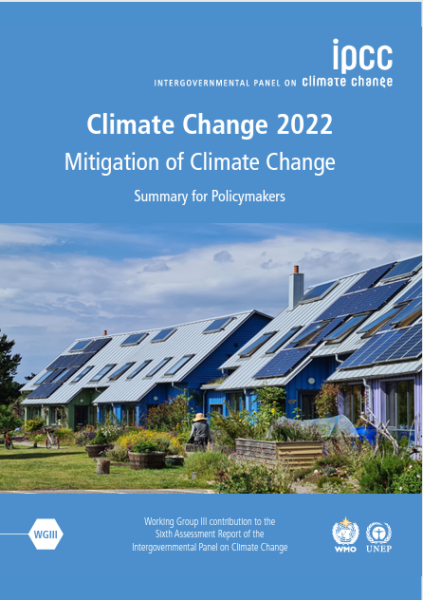IPCC AR6 Climate Change 2022 (WG III) Report:
Immediate and deep emissions reductions across all sectors are required.
On April 5, 2022 (JST), the Working Group III (WG III) of the Intergovernmental Panel on Climate Change (IPCC) released the Sixth Assessment Report (AR6) on the mitigation of climate change.
This report is the third installment of the IPCC’s Sixth Assessment Report (AR6), following the WG I report (August 2021), which stated “there is no doubt that human impacts are warming the climate system,” and the WG II report, which concluded that “human-induced climate change is accompanied by more frequent and intense extreme weather events that go beyond natural climate variability and causes widespread adverse impacts and associated losses and damages to nature and people”. The AR6 Synthesis Report is scheduled to be released in September 2022.
The report highlights that the average annual global greenhouse gas emissions from 2010 to 2019 were at the highest levels in human history. It warns that the emission reduction targets set by each country at this time are likely insufficient to limit global warming to 1.5°C. The assessment shows that limiting warming to around 2°C still requires global greenhouse gas emissions to peak before 2025 at the very latest. The report also shows that immediate and deep emissions reductions across all sectors are required, while the cost of renewable energy is rapidly declining – even falling below the cost of fossil fuels due to an increasing range of policies and laws adopted by each country.
The report analyzes and evaluates climate change mitigation measures on the demand side, including the general public, such as lifestyle changes, in addition to sectors such as energy, industry, cities, buildings, transportation, agriculture, and forestry.
Regarding the energy sector – the largest source of emissions – the report pointed out that major changes are necessary, such as substantially reducing fossil fuel use by 2030, rapidly shifting to renewable energy, expanding electrification, and improving energy efficiency. While carbon capture and storage (CCS) is mentioned in the report as a mitigation measure for the energy sector, it is also noted that CCS still has limitations in terms of its impact on technology, economy, institutions, society, culture, and ecosystems. Hydrogen and ammonia, which Japan hopes to use as a last resort to combat climate change, were not presented as options for reducing emissions.
Dr. Hoesung Lee, Chair of the IPCC, stated in a press release, “We are at a crossroads. The decisions we make now can secure a liveable future. We have the tools and know-how required to limit warming.”
Japan is also required to significantly raise its emission reduction target for 2030 and steadily take concrete measures such as phasing out coal-fired power generation and significantly expanding renewable energy.
Report Download:
IPCC AR6 (WG III) Report:
Climate Change 2022: Mitigation of Climate Change
https://www.ipcc.ch/report/ar6/wg3/
Related Links
Ministry of the Environment: Regarding the Publication of the Working Group III Contribution to the Sixth Assessment Report of the Intergovernmental Panel on Climate Change (IPCC)

